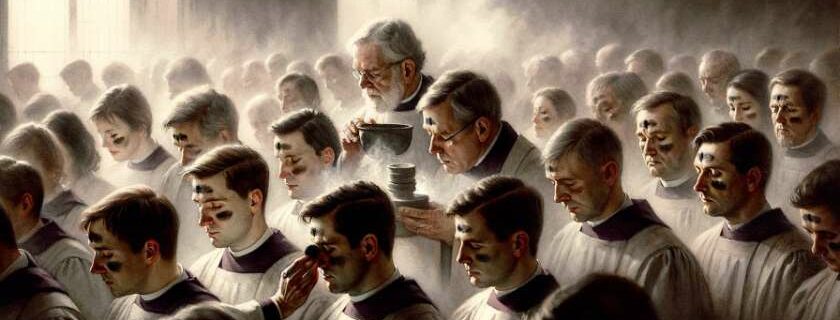Ash Wednesday is a Christian holy day of abstinence and repentance. It occurs 46 days before Easter and marks the beginning of Lent, 40 days of fasting and penance. According to the Bible, Jesus Christ fasted for 40 days in the desert before fulfilling his prophecy to die on the cross.
Ash Wednesday ashes in services are made from palm branches burned on Palm Sunday the previous year. The practice of placing blessed ashes on the forehead by priests in the form of the cross on Ash Wednesday holds a deep significance in the Christian church and its traditions.
Key Takeaways
- It marks the start of Lent, prompting reflection, repentance, and preparation for Easter. The ashes symbolize mortality and the call to turn away from sin.
- Dating back to the 11th century, the practice involves distributing ashes on the forehead in a cross shape, observed by Catholics, Anglicans, and other Christians.
- Ash Wednesday involves fasting, prayer, attending Mass, and acts of penance. It’s a time for reflection, seeking reconciliation with God, and spiritual growth throughout Lent.
Contents
History: Ash Wednesday
Ash Wednesday will be celebrated as the first day of Lent before Holy Thursday. It is a season of repentance before the resurrection of Jesus Christ on Easter Sunday. Ash Wednesday falls every six and a half weeks before Easter and marks the beginning of Lent in the Christian calendar, although, in the early Christian church, the length of the celebration varied.
Although Ash Wednesday marks the start of Lent, it isn’t clearly stated in the Bible. The celebration of Ash Wednesday can be traced back to the 11th century. At the same time, the use of Lenten ash has earlier roots that can be traced to the ancient customs in Hebrew, where people clothe themselves with sackcloth and dust themselves with ashes as a form of penitence.
Traditionally, an early Catholic priest and his followers gave up foods like meat and dairy until Lent was finally over. In the present, people see abstinence as forgoing bad habits that alter or refrain from doing usual things like going to a party, indulging in too much sugar or candy, or throwing extravagant parties. These sacrifices reflect the 40-day period of Christ’s fasting in the desert, which is why Catholics don’t eat meat during this season.
To this day, many Christians from all over the world observe Ash Wednesday to celebrate, as Ash Wednesday marks the first day of Lent. This is their way to enter the season of self-examination, repentance, and increased devotion to God.
When Is Ash Wednesday 2024?
Ash Wednesday 2024 falls on February 14, 2024. Its celebration happens 46 days before Easter—following Shrove Tuesday—and marks the end of Lent. On the other hand, Easter Sunday should fall on the Sunday following the full moon after the spring equinox.
Because Easter Sunday is a moveable holiday, Ash Wednesday is also flexible regarding the date. The observance of Easter Sundays serves as a basis for other important dates in Christianity.
How Ash Wednesday Marks Christianity
In celebration of the holiday, people follow the tradition of drawing a cross on their foreheads using the ashes created from burned palm leaves from the previous year’s Palm Sunday. On some occasions, ashes from dried palms are sprinkled over their heads during mass.
Both practices are a sign of asking forgiveness for sin and a reminder that we will return from the dust we came from and into the dust we shall return.
How Is Ash Wednesday Important?
As the first day of Holy Week, Ash Wednesday holds great significance for Catholics and Christians. This day awakened the people to the period when Jesus went to the desert before his crucifixion. It also serves as a time to focus on what is essential and the start of the long wait for the world’s salvation.
As we receive ashes on this holy day, we practice our tradition in action and prayer as we prepare ourselves for the day Jesus rose from the dead after Lent. On Ash Wednesday, we also recognize the need for conversion from being broken to becoming whole once more.

How To Observe Ash Wednesday
As Ash Wednesday falls on February 14, 2024, Christians need to know how to observe this celebration. The observance of Ash Wednesday is not only limited to the tradition of fasting but also extends through almsgiving, praying, attending mass, and building a ministry to spread the gospel and create a lasting relationship with others.
This Ash Wednesday, 2024, prayer isn’t only in the tradition of the Catholic Church but can also include the intentional reading of the gospel and a careful understanding of the Bible from the New and Old Testaments.
Fasting On Ash Wednesday
In Christianity, Ash Wednesday and Good Friday are times of fasting. In addition to the traditions, skipping one full meal is observed as penance and to make way for the spirit to be filled with the Holy Spirit. Fasting also allows people to embody their hunger for Christ, who fasted for 40 nights before his crucifixion on the cross.
Diet On Ash Wednesday
Catholics and Christians who celebrate Ash Wednesday are expected to give up eating meat every Friday, starting on the first day of Lent. People also fast on Ash Wednesday and consume smaller meals instead of the entire meal they consume on a typical day, while others skip the meat and eat vegetables and fish.
Other people consider it self-sacrifice and part of the traditions and practices of their religion. This Ash Wednesday 2024, know the specific guidelines for fasting and abstinence, as they can differ depending on the particular Christian denomination or tradition.
Age Requirement
Catholics from ages 18 to 59 must observe fasting and pray on Ash Wednesday. Traditionally, people are obliged to abstain from meat, fast, and attend church services to prepare their hearts for the Easter season.
What Happens During Ash Wednesday?
Ash Wednesday, the solemn observance that marks the beginning of Lent, holds significant rituals and practices for Christians across denominations. This is what typically happens during Ash Wednesday services.
- Distribution of ashes: Ash Wednesday services involve pastors distributing ashes to the faithful. This act symbolizes the ancient Jewish tradition of repentance and mourning, as well as the biblical reminder from Genesis 3:19, “For dust thou art, and unto dust thou shalt return.” Priests and pastors administer ashes by making the sign of the cross on the foreheads of the worshipers, using blessed palm branches from the previous year’s Palm Sunday.
- Liturgical readings: Ash Wednesday services often include specific scriptural readings that highlight the themes of repentance and renewal. The Seven Penitential Psalms, such as Psalms 6, 32, 38, 51, 102, 130, and 143, are commonly recited or sung during these services. These seven penitential psalms express heartfelt remorse, seeking God’s mercy and forgiveness.
- Penitential procession: In some churches, a penitential procession may be part of the Ash Wednesday observance. Clergy often leads participants to move solemnly, reflecting on their mortality and the need for repentance. This procession serves as a visual representation of the journey toward spiritual renewal and transformation.
- Reflection and prayer: Ash Wednesday is a time for personal reflection and prayer. During the service, believers are encouraged to examine their lives, confess their sins, and seek reconciliation with God. It is a moment for introspection and a renewed commitment to living out one’s Christian faith.
- Opening of Lent: Ash Wednesday is the gateway to the season of Lent, a period of 40 days (excluding Sundays) leading up to Easter. As such, Ash Wednesday holds great significance in the Christian faith. It serves as a solemn reminder of our human frailty, the need for repentance, and the hope of redemption through Christ’s sacrifice.
- Sunday mass: While Ash Wednesday is not a holy day of obligation for all Christians, many believers choose to attend Mass on Easter Sunday. Sunday Mass may include a special focus on the Ash Wednesday observance, providing an opportunity for the congregation to receive ashes and participate in the liturgical rites associated with the day.
Ash Wednesday is a meaningful and contemplative observance of the Christian faith. It involves pastors and priests distributing ashes to the faithful, reflecting on biblical reminders of mortality, and engaging in acts of repentance and prayer. It opens the Lenten season, offering believers an opportunity for self-examination, renewal, and a deeper connection with God.

What Is The Significance Of The Ashes On The Foreheads?
On Ash Wednesday, also called the Day of the Ashes, Roman Catholics and some Christians follow the Ash Wednesday practice of receiving ashes on their foreheads in the form of a cross.
On this holy day, the ashes symbolize both the death and repentance of the people in preparation for the Lenten season. It marks the time for people to reflect on their sins before the Easter season when Jesus’ resurrection from the dead is celebrated.
Churches utilize palm branches from the previous year’s Palm Sunday church services. The palm leaves are incinerated and turned into ash. While the pastor or priest spreads ashes on the foreheads, he will say, “From dust you came, and into dust you shall return[1].”
Although Ash Wednesday and the ash cross on the foreheads are not mentioned in the Bible, the ashes symbolize men’s sin and sorrow. Thus, this Ash Wednesday 2024 marks the start of repentance, fasting, and renunciation and signifies the solemn beginning of Lent.
Who Can Receive Ashes On The Forehead?
Many Christians observe a significant ritual on Ash Wednesday: the distribution of ashes. It is a practice that transcends denominational boundaries and is open to believers from various Christian traditions.
Catholics
In the Catholic Church, Ash Wednesday holds great importance as it marks the beginning of Lent, a period of reflection and preparation leading up to Easter. During Lent, Ash Wednesday is observed by attending Mass, where priests administer ashes by marking the sign of the cross on the foreheads of the faithful. The ashes symbolize the biblical reminder from Genesis 3:19, “For dust thou art, and unto dust thou shalt return.”
Anglicans And Episcopalians
Similarly, Anglican and Episcopal churches also observe Ash Wednesday as the start of Lent. The practices involve pastors distributing ashes during church services, allowing all baptized Christians to receive the symbolic ashes on their foreheads.
Protestant Churches
While Ash Wednesday is most commonly associated with Catholic and Anglican traditions, many other Protestant churches have also embraced this observance. Although the specific practices may vary, these churches recognize the significance of Ash Wednesday as the gateway to the Lenten season. Some churches may offer special Ash Wednesday services where ashes are applied to the foreheads of the congregation.
Other Christians
It is worth noting that while Ash Wednesday is a significant day, it is not a holy day of obligation for all Christians. However, it is highly encouraged for believers to attend Ash Wednesday services to partake in this meaningful tradition.
Ash Wednesday opens Lent, a season of introspection, repentance, and spiritual growth. Regardless of denominational differences, the act of receiving ashes on Ash Wednesday unites Christians in their shared journey of faith. Whether you are a Catholic, an Anglican, or a member of another Protestant church, the opportunity to participate in this sacred ritual is open to you.
While some Christians may choose to attend Sunday Mass to receive ashes, it is important to remember that the distribution of ashes on Ash Wednesday is not limited to a specific liturgical setting. Churches may offer additional opportunities for believers to receive ashes throughout the day or evening services dedicated to this purpose.
Receiving ashes on the forehead on Ash Wednesday is a deeply meaningful practice that many Christian denominations observe. The ashes, created by burning palms from the previous year’s Palm Sunday celebration, symbolize our mortality and the call to repentance.
Whether priests, pastors, or other church leaders administer them, the ashes serve as a tangible reminder of our mortality and the call to repentance, symbolizing these concepts.
It is an invitation for all baptized Christians, regardless of their specific faith tradition, to partake in this solemn observance and embark on a transformative Lenten journey.

Bible Verses For Ash Wednesday
Ash Wednesday is a symbolic date for all people walking with the Lord Jesus Christ, as it marks the beginning of Lent. As we celebrate Ash Wednesday 2024, here are some Bible verses that will help you meditate and reflect on important things for you as you observe the celebration.
Get rid of the old yeast so that you may have a new batch without yeast—as you are. Christ, our Passover lamb, has been sacrificed. Therefore, let us keep the festival not with the old yeast, the yeast of malice and wickedness, but with bread without yeast, sincerity, and truth.
— 1 Corinthians 5:7–8
“For God so loved the world that he gave his one and only Son, that whoever believes in him shall not perish but have eternal life; for God did not send his Son into the world to condemn the world but to save the world through him.”
— John 3:16–17
Woe to you, Korazin! Woe to you, Bethsaida! For if the miracles performed on you had been performed in Tyre and Sidon, they would have repented long ago, sitting in sackcloth and ashes.
— Luke 10:13
“Even now,” declares the LORD, “return to me with all your heart, with fasting and weeping and mourning.” Rend your heart and not your garments. Return to the Lord, your God, for he is gracious and compassionate, slow to anger and abounding in love, and he relents from sending calamity. Who knows? He may turn and have pity and leave behind a blessing—grain offerings and drink offerings for the LORD, your God.
— Joel 2:12–14
On the evening of that first day of the week, when the disciples were together, with the doors locked for fear of the Jews, Jesus came and stood among them and said, “Peace be with you!”
— John 20:19
When Mordecai learned of all that had been done, he tore his clothes, put on sackcloth and ashes, and went out into the city, wailing loudly and bitterly. But he went only as far as the king’s gate because no one clothed in sackcloth was allowed to enter it. In every province to which the edict and order of the king came, there was great mourning among the Jews, with fasting, weeping, and wailing. Many lay in sackcloth and ashes.
— Esther 4:1–3
Prayer For The Day Of Ashes
Our Heavenly Father,
Show mercy on us. As one church, we offer you our sins, Lord Jesus. May the ash on our foreheads remind us that we would be dust without your grace and mercy. As this Ash Wednesday 2024 observes the beginning of Lent, be with us as we repent and believe in preparation for the day you will come again.
By your Holy Spirit, we pray that you give us conviction as we go in abstinence and repentance. Remind us of your holy sacrifice, and do not let the devil’s works win over us as your followers and worshipers. With these ashes on our foreheads, we, your people, the Roman Catholic Church, await the holy day when we are redeemed and restored and can no longer bend because of temptation.
In blessed Christ’s name, we pray.
Amen.

Summary
This year, Lent Ash Wednesday falls on February 14; it is a day of reflection and repentance for Christians. It observes the beginning of the season of Lent, which is a time for us to reflect on our actions, thoughts, and behaviors, encouraging us to prepare to celebrate Easter.
The ashes applied to our foreheads during this Ash Wednesday 2024 remind us that we are mortal and will all eventually die. This is a symbol of our need to repent and turn away from our sins, urging us to live a life with purpose and humility.
Frequently Asked Questions
What is Ash Wednesday and why do we celebrate it?
Ash Wednesday, marking the start of Lent, is a Christian observance occurring 46 days before Easter. It involves the application of ashes, symbolizing mortality and repentance, to believers’ foreheads. These ashes, often from palm branches, serve as a reminder of human frailty and the call to spiritual reflection and renewal during the Lenten season.
What do you say when you receive ashes?
When receiving ashes on Ash Wednesday, individuals often hear the words: “Remember that you are dust, and to dust you shall return,” or “Repent, and believe in the Gospel.” These phrases serve as reminders of human mortality, the need for repentance, and the call to live according to the teachings of Jesus Christ.
What is the purpose of Lent?
Lent, observed by many Christians, is a period preceding Easter marked by fasting, prayer, and reflection. It’s a time for believers to deepen their faith, repent of sins, and prepare spiritually for the resurrection of Jesus Christ. Additionally, Lent allows Christians to identify with Christ’s suffering and sacrifice during His 40 days of fasting in the wilderness.
